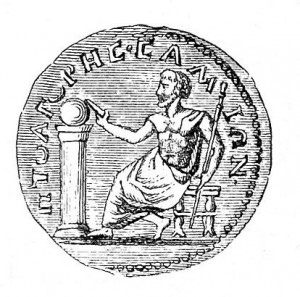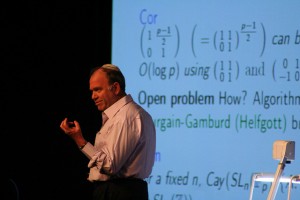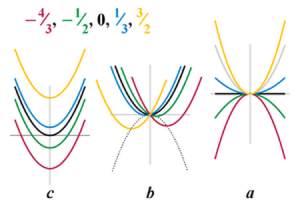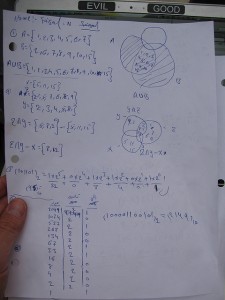Recently the Washington Post published an article that carried interesting mathematical news.
I know, you didn’t think there could BE such a thing, so boring is mathematics.
But there’s news, all right: Many states are now requiring high-school students, no matter how mystifying they find numbers and formulas, to take not only basic math but also an advanced course, Algebra II.
The Post article began by stating the crux of the matter as seen by mathematical dodos like me:
With its intricate mysteries of quadratics, logarithms and imaginary numbers, Algebra II often provokes a lament from high-schoolers.
“What exactly does this have to do with real life?”
Precisely.
From the moment I walked out of my final exam in Algebra ONE in high school, I can’t remember using a mathematical formula. Not to shop. Not to cross a busy street. Not to write. Not to get out of a jam. Not for anything that I can think of.
Now, as a reasonably organized Virgo, I appreciate math’s emphasis on logic and accuracy. But does anyone need an ADVANCED course to drum this into his head?

Pythagoras, shown here on a 3rd-Century coin, was not just a mathematician. He was also a philosopher and mystic. Must have been BOTH left-brained and right-brained. (Wikipedia Commons)
In college, I had a fraternity brother, a pre-engineering student, who carried his slide rule just for decoration. He could do equations in his head. I thought he was the second coming of Pythagoras. Not that I remember a lot about Pythagoras, other than he had some famous theorem related to triangles.
He — my friend, not Pythagoras — in turn, thought I was Ernest Hemingway, just because I could align verbs with nouns in a string of words.
My buddy had shot way past Algebra II into “trig” and beyond – and I shiver to think what THOSE courses must have been like.
Good for him. By now, I’m sure, he’s building better mousetraps or computers or mountainside viaducts, or developing the gear that sends our astronauts into space.
I, on the other hand, write a humble blog and other essays about America. No doubt he’d say my job is harder.
Which brings me back to the question. If I’ve done OK for half a century without Algebra II, why should mathematically clueless high-school students be REQUIRED to take it?
So I asked my editor, Rob “Archimedes” Sivak, who supervises VOA’s science, health, and agriculture reporters — and me. He snorted at the very idea that one would dismiss the value of taking advanced math:
“As hard and vexing and confounding as math often is (to those of us with the basic brain wiring kit), it is beautiful, fundamental, profound,” he wrote me.
“Beautiful”! “Profound”! Mathematics?? Bear with him:

Einstein, remembered here in a statue at the National Research Council, was a genius. But if you have a poster of him on your wall, you're a nerd! (Carol M. Highsmith)
And while we can’t all visualize the space-time continuum of general relativity in our HEADS the way Einstein is said to have done, we can certainly prod ourselves to keep at the hard work of trigonometry and geometry and calculus, because it’s a noble venture to try to understand the way the world is structured. Besides, the effort also exercises the brain and, like the crossword-puzzle-a-day prescription as a bulwark against Alzheimer’s disease, solving even simple math problems keeps those neurons firing!
I suspect that Alzheimer’s Disease reference was a shot aimed directly at me. Now, where was I?
I look back at my other high-school courses and can see at least SOME relevance to my life as it unfolded:
American history: I incorporate it into almost everything I write.
American Lit: Not so much, but occasionally a pithy F. Scott Fitzgerald quote spices up a piece.
Geology: I’ve been to places such as Arches National Park in Utah where its relevance looms in front of you in vivid red.

See now, what I learned in wood shop has all SORTS of practical applications. (mtneer_man, Flickr Creative Commons)
Shop class: I haven’t cut off a finger with my circular saw yet.
Home Economics: Yes, boys as well as girls were required to take this at Lakewood High School. Thanks to it, I still make a mean egg salad.
Geometry: Carol says I have a good “spatial” sense when she asks me to move furniture around. I still get my isosceles mixed up with my equilateral, however.
Composition: Please!
Typing: I’ll have you know I was the fastest in the class, despite my stubby fingers. That is, until I took sick for three weeks and missed the numbers part. Now I type like the wind without looking at the keyboard until I need an 8 or a %. Then I screech to halt and hunt the right key for a slow and dainty finger-peck.
**Future blog alert!!! How DID they come up with the alignment of the letters and numbers and punctuation marks on the typewriter — now computer — keyboard?**
Drama: Hey, I played old man Clarence Day in “Life with Father” and the Major General in the “Pirates of Penzance.” Check out the podcast of this post, and I’ll break into “I am the very model of a modern major-general.”
Phys. Ed.: OK, I don’t rope-climb any more, and I never could do chin-ups with my stick-figure arms. But we own an imposing-looking treadmill. It’s an ornament, but I recognize how valuable it could be.
Which brings us back to the alleged value of advanced mathematics courses at a tender age.

I agree that it's noble, or at least awfully useful, to know how to design bridges and keep them standing. (Brendan Reals)
I think Rob is right to say that it’s a “noble venture” to try to understand the way the world is structured. And nobler still to improve that structure.
But that’s work for others, not me, and more power to them.
And I can appreciate the value of requiring all teenagers — even creative story writers and dreamy poets — to take BEGINNING algebra for the logic practice.
But spare them Algebra II, trig, and such.
As New Yorker magazine writer Calvin Trillin put it, “I never did well in math. I could never seem to persuade the teacher that I hadn’t meant my answers literally.”
If you think about it, the debate over the merits of requiring coursework that may not suit all students’ native abilities can be expanded to higher education.

They don't make star athletes take too many theoretical courses. So why make dreamers take math? (Michael Oh, Flickr Creative Commons)
The other day, I heard a sports-talk radio host opine that colleges’ premier “student-athletes” — many of whom are as studious as I am muscular — should be able to blow off academic classes, since everybody knows big state colleges are simply “football factories” whose jocks bring in millions of dollars to the school through their performance on the field. The players are in college solely because it’s their ticket to lucrative professional careers.
And their coaches keep their high-paying jobs, the sportscaster asserted, by winning games and turning out star players who serve as useful success stories that impress the next recruiting class of stud athletes. The coaches are no different from the engineering faculty, who build the school’s reputation and endowments — and their own tenured security — by turning out world-class engineers.
In short, chirped this talkmaster, not just the athletic department but also colleges as a whole have become glorified trade schools with fancier trappings.
I’m not sure how the philosophy faculty would feel about this, since they’re not exactly running a philosopher job mill.
They and others would surely call the sportscaster’s reasoning absurd and argue that a broad, liberal-arts grounding builds intellectual rigor and curiosity in every student.

One hopes this mathematician has some life skills beyond doodling formulas. Otherwise this lecture would be BOR-ing. (maanow, Flickr Creative Commons)
Come to think of it, this sounds a lot like the argument of those who are now requiring Algebra II in high school, that it teaches life skills beyond formula coefficients and the like.
As a bumper sticker that I saw recently put it:
“Math is radical!”
I think that’s a pun. Had I taken Algebra II, I guess I’d know.
Tell me what you think about requiring advanced algebra in school.
Ted's Wild Words
These are a few words from this posting that you may not know. Each time, I'll tell you a little about them and also place them into a cumulative archive of "Ted's Wild Words" in the right-hand column of the home page. Just click on it there, and if there's another word that you'd like me to explain, just ask!
Coefficient. In mathematics, this is the number before a variable. In the formula 25x + 5y = 100, for instance, 25 and 5 are both coefficients. Or so my math friends tell me.
Dodo. A clumsy, flightless — and thus now-extinct, bird. Its inability to cope in a hostile world of predators has become a metaphor for human ineffectiveness and bungling as well.
Pithy. Concise and forceful. Pith is the substance beneath the surface of a plant, such as the “white part” of an orange under its skin, so “pithy” relates to getting to the heart of a matter. And a “pith helmet” — the kind that every respectable British explorer wore in the jungle in old movies — is made from a lightweight, corky pith from certain trees.
Trappings. Ornamental clothing or furnishings. The word is often used to describe handsome or fashionable adornments, as in the “trappings of success.”
Trig. Short for trigonometry, which, I’m told — God knows I had to look this up — has to do with computing the length of the sides of triangles by knowing the triangle’s angles and measuring the length of one side. (Math brains: help me out here!)




21 responses to “Math, Smath”
Education is important but forcing everyone to learn everything is a waste of time – put it this way – if we try to make everyone capable at a bunch of subjects we become mediocre at everything – everyone is good at something, every person excels at something – it’s a shame we do not allow pathways that facilitate what each person is good at. Think about this for a moment –our children go to school, for 1 hour this course, the next hour another and so on – robotic– what if you have a child that wants to do math for 2 or 3 hours, or write for 2-3 hours, art for 2-3 hours? Standardized education will not allow for this at the moment. What right do we have to say stop doing what you are good at, what you are interested in and do this other thing? This is a shame because we are preventing the type of genius that we are trying to create by way of education – the down time between learning is more than necessary to allow what a child learns to solidify, our system does not allow for the freedom to learn that is necessary for children to advance to where they could or should be – Start young and give the child all that they can and want to take – they will let you know when enough is enough – take a break, when they are ready they will zoom again -small kids can learn incredibly fast and excel more rapidly than most are today. Forcing us like cattle down this road or that road is pointless IMHO and results in losses for society and the individual.
John,
Really provocative response. On first reading, your arguments make eminent sense, though I’m not sure how school administrators would arrange the school day in such a way that, say, artistic types could take extended time in art class and less time in math class. And you appear to dismiss the whole notion that taking things we’re not very good at broadens us. Carried to its conclusion — which is already happening online to a degree — people would read, listen to, and watch only things that they liked. That’s pleasant for them but maybe not so good for our society, especially when it comes to politics.
Keep reading and writing me, though, and send me your story suggestions.
Oh, and I had to look up “IMHO,” so you’re obviously a generation or two behind me. For other geezers, it’s texting shorthand for “In My Humble Opinion.
Thanks again, John.
–Ted
Teach math to children via. statistics rather than algebra and math will become everyday to everyone. As any statistician will tell you, the math of statistics is just as rigorous as the math of algebra. Probably is fun. The Binomial Theorem is not.
I went to a community college for the sole purpose of going into the Culinary classes for PERSONAL, not PROFESSIONAL reasons. It was boggling that I had to take and pass so many required courses just to be able to get into the course. I passed all of them besides the mathematics. My whole life, I have been horrible at all but basic maths.Pre-Algebra gave me a difficult and disturbing look into a realm I dared never to look into again. Then I was told I NEEDED to pass Algebra I as a prerequisite to get into my chosen field… Needless to say, I failed. Three times. Couldn’t test out. Couldn’t try again. Couldn’t pass go. Because of one class, I was refused entry into something I have wanted to do my whole life. And when I finally had the time and resources to do so, it was devastating to be told that I never could do it.
I have nothing against math, but why require me to take something that has not a thing to do with the classes I wanted to take? (I spoke with the Culinary department head and she said basic math and some pre-algebra would be adequate for the course) I hope someday, someone can tell me…
“Math, smath” really caught my attention. I had to chuckle all the way through, especially when Ted wrote “I haven’t cut off a finger with my circular chain.” My reaction was – “how would a person know how many fingers they cut off, if they couldn’t count.”
Math is useful for all types of people whether they talk in concrete practical “circular saw” terms or abstract theoretical terms used by scientists and engineers. I agree that all students do not have an interest in math, or have logical-mathematical intelligence ( one of Howard Gardner’s Multiple Intelligences). Even if a child has a potential for math, if may take several years of studying and playing with it, before they reach their potential. So not teaching “advanced” math to many young otherwise capable students may condemn them to be math dummies, and lower their expectation of what they can achieve.
I learned Calculus from a professor in college who was very playful, and made learning fun. When his blackboard was full of writing, he wrote in chalk on the side walls, even on the floor. He laughed and joked a lot. An amazing guy (Professor Harvey at Acadia University, 1954 …) The Calculus field of math seemed like “Greek” to me at the beginning, but at the end of the semester I got an A in the course, and went on to become an electrical engineer at Bell Telephone Labs. Some useful things were invented there by engineers and scientists – like telephones and the transistors found in all smart phones and computers today.
Our future is formed from concepts and goals in our minds at the present time. Things are invented twice – first as an idea in the mind, then as the actual circular thing in the world – whether it be a wheel, circular chain saw, or a new pizza. A perfect circle uses less pizza dough and makes more $ dough. Just as we hear that “time is money”, so “math is money” – from pizzas to pyramids.
In my book (The EPIC roles of consciousness) – I use some simple math concepts about prime numbers represented by practical hexagon shaped bathroom floor tiles as information containers to model patterns of information that people hold in working memory about the world they perceive, reason about, and act to achieve goals. Some quite useful results were obtained – after all math is useful because it makes the invisible visible (Keith Devlin, 1998).
Thanks for your provocative blog!
Walter Geldart
Master’s in Engineering Engineering
author “The EPIC Roles of Consciousness”, 2010 (Amazon)
If you argue that learning “advanced” math shouldn’t be required from students, would you also argue that students should not have to attend English, literature, or history classes after a “basic” level?
I am an engineer by training, and use “super-advanced” math (I guess you would call it that) on a daily basis, yet I would estimate less than 2% of my time is spent on any form of proper writing that would require me to utilize the “advanced” English and literature skills I had to suffer through in high school and college. Why should I have had to sit through those courses, even though I do not use those skills in my normal life?
The answer, is that it makes us well rounded individuals. Because I can write properly, I can communicate with non-engineers to get my ideas across and further my career. Because I know something of literature and history, I can carry on conversations with people who couldn’t tell an ohm from a mho. It allows me to function in society with other people who are not like me.
Learning “advanced” math will help students understand some of the underlying principles behind everyday things. If you’ve ever earned interest on your money, you’ve benefited from “advanced” math. No, not everyone will grow up to be a rocket scientist, but it would be nice to know that the English major waiting on your table knows how to make proper change.
I am very intrigued with the ideas of redefining the educational mission and implementing a more customized, personalized student coarse load. I think such ideas may hold the key to fostering the educational renaissance we all seek. Perhaps fewer students would drop out of high school if they were allowed to become very passionate about something at a young age (at least very enthusiastic) and then encouraged to learn in that direction. It is time to redefine the educational system’s approach to college preparation.
Lets keep this discussion going. I propose that we also submit our ideas of what that might be including a syllabus for each subject within the coarse load. What subjects are required to both prepare a person for life and citizenship?
Ted, you’ve actively put down any intellectual pursuit that a kid is not interested in. Guys like you are why a lot of smart kids aren’t going into useful professional careers. They get put down as just nerds! So the jobs they could be filling are being sent overseas.
Math and a lot of other “highbrow” subject stretch the brain. Just like a proper food diet encourages proper growth of the physical body. Or like physical training develops proper musculature with exercises that you never use in daily life.
You sound just like my grandchildren. “Algebra is the world’s most useless subject!” They found out a lot different when they got to the University to learn to do something that could do some good in the world.
To Justin:
I feel your pain! Surely you don’t use formulas to calculate ingredients on the cooking line.
–Ted
To Robert,
Did I read your fair criticism too quickly, or were you mixing some apples and some oranges?
You say I “put down intellectual pursuits that a kid is not interested in.”
Then you say people like me steer smart kids from going into professional careers because they get put down as nerds. But smart kids who aspire to professional careers presumably would be concentrating their brains on the subject of their profession — medicine, for instance. They wouldn’t be dwelling on algebra and American literature and the like beyond what was required of them. I’m all for broadening students’ exposure, but not cramming advanced courses in unrelated fields down their throats!
–Ted
To “spado.”
In our editorial meeting this morning these very words were spoken:
“Should colleges (we were talking about them, not high schools) prepare students for life or for professions?”
You could argue that they should do both, of course. I don’t think they should be professional assembly lines, but I don’t think they should force students — beyond the introductory level so as to expose them to new ideas — to take courses that are far afield from their abilities, interests, and potential careers.
p.s. — check your spelling (“coarse”) if we are to have that dialogue!
–Ted
Dear Dave,
You made my argument, actually, especially about the importance of good writing to ALL professions. Good writers get farther ahead in any field, I contend.
But I think there’s a limit to what is imposed on a student. When I say “basic,” I don’t mean a quickie brush-up on a topic just to meet a requirement. The “basic” course in, say, American Lit, ought to be comprehensive and just as tough as any other class. And students should be confronted with others like it in their first and second years. Then if they “take” to them, they can elect advanced courses.
–Ted
To Walter,
You’re being playful with your comment about needing to know much math to know how many fingers I might cut off with my circular saw.
I do agree that a really good teacher using imaginative classroom techniques could reach just about anybody.
Perhaps it was a coincidence that my math and chemistry teachers were by-the-book, unimaginative martinets who made those classes a drudge and a nightmare. Yet those with math and science predisposition seemed to take to these teachers just fine. Had they made their subjects more fun, I might have grasped them and even looked forward to those classes. But that’s a slippery slope, too, because classes that lack rigor can be awfully unnourishing.
It’s a delicate balance — something that we struggled with in journalism school. Do you give readers (in this case, students) what the want, or what they need?
–Ted
I think it imperative to help each student discover pursuits that they are absolutely passionate about and to steer them in those directions. Passion is not given sufficient weight and its power to motivate is still undervalued in our society. It is the advice of motivational speakers when it should be the cornerstone of career development courses. Once a person discovers where their passion lies, and nothing less than their passion, it is easy to appreciate the necessity and importance of relevant subjects necessary for proficiency. Carrots fail to motivate when they are suspended behind the horse.
I was interested in taking a full culinary course.
I feel that in high school, there should be more of an emphasis on math and science in general. You might not learn anything tremendously practical but you could be introduced to things you want to do for the rest of your life.
In high school I took the mandatory quarter of freshman physics and hated it. The problem was in fact that I had taken advanced math courses and the concepts being taught were boring to me. I never gave physics a second thought after that. Fast forward 6 years and I’m reading physics books in my spare time.
I needed to take 3 quarters of freshman physics at my university to satisfy a graduation requirement and I put it off for a couple years because of how uninteresting I found it in high school. Trig was a prerequisite for the sequence so we didn’t just learn about 1 dimensional motion. We learned fascinating concepts like how light acts like a particle and a wave depending on what the observer decides to look for. Now I’m hooked and taking a class on electromagnetism and another on classical mechanics.
My point is that as a teenager you don’t know what is going to grab you and pull you in mentally. For that reason, kids should be forced to take algebra II. I’m not sure what was in algebra II because I took it as a freshman in high school but I know I’ve used it since in other math classes and science courses. I’m sure if I had become an engineer or an architect I would need it too. The most amazing developments of society come from technological advancements and kids who start out slow in math are missing out if they aren’t pushed to go further.
Dear Aleks,
Your most telling point, I think, is that as high-school teenagers, we don’t know how our life will unfold and what will interest us later in life. The same is true at just about any stage of life, as it turns out.
But I still think those who put together high-school curricula would have to have very strong evidence that the lessons of Algebra II will likely have wide application years into the future to convince me that math beyond Algebra I is valuable for all. For those with the slightest mathematical inclinations, sure. But the rest of us?
–Ted
Ted,
This is an excerpt from Seth Godin’s blog this morning which I found interesting and relevant to your editorial Math, Smath.
What’s high school for?
Perhaps we could endeavor to teach our future the following:
How to focus intently on a problem until it’s solved.
The benefit of postponing short-term satisfaction in exchange for long-term success.
How to read critically.
The power of being able to lead groups of peers without receiving clear delegated authority.
An understanding of the extraordinary power of the scientific method, in just about any situation or endeavor.
How to persuasively present ideas in multiple forms, especially in writing and before a group.
Project management. Self-management and the management of ideas, projects and people.
Personal finance. Understanding the truth about money and debt and leverage.
An insatiable desire (and the ability) to learn more. Forever.
Most of all, the self-reliance that comes from understanding that relentless hard work can be applied to solve problems worth solving
Steve
Dear Steve — and Seth:
I don’t want to be too glum, but in a world preoccupied with superficialities — if that’s a word — that checklist is pretty ambitious. Before long, will we even have TEACHERS capable of imparting such knowledge, let alone students able to grasp it?
Ted
I tried to keep my earlier (April 28) comment short and perhaps I overshot the mark. My comment slipped by unnoticed where I think it should have aroused at least a modicum of interest. Please bear with me as I expand upon my entry and, hopefully, focus some attention on the core-questions of high school math: “What’s the use of teaching math,” and, “Isn’t there a more effective and less painful way of doing so?” The original blog and its comments show what a vice-grip algebra has on peoples’ minds. Most think that math is algebra and algebra is math. Nearly everyone feels that the only route to the beauty rigors of math is through algebra. This is false. All mathematicians will give algebra its due to be sure, but then they will be quick to point-out that mathematics is much, much, much more than algebras one and two. One of these ‘much’s’ is statistics and I strongly advocate for its being the cornerstone of math education in middle and high schools rather than today algebra. Students (All of us–even we retired old geezers–are in one way or another students.) are immersed in a world of statistics from the early sociological arithmetic of ‘how many are mine’ and ‘why not all’ to the old-geezer questions on the probability of a real heaven and the chances of one-less-than-angelic’s getting in? Shouldn’t we equip children–future geezers–with the skills that they need to deal with such questions (statistics) rather than setting them up to determine the value of ‘x’ to five significant digits (algebra). Those of you who are older, are you more concerned with the value of ‘x’ or the value of the dollar? Would you like to calculate the longest side of a right triangle given the shorter two sides or determine the chances that the world’s economy will collapse within the next five years?
Dear readers,
In addition to the many comments printed here, I received FOUR separate, and quite cranky, comments on this blog from one individual. He was quite critical and out of sorts, as I said, but I would have published all of his remarks had he not felt compelled to lace his diatribes with obscenities. Sorry, guy. Free expression is treasured here. But only the civilized kind. Don’t you realize that whatever punch your point make is spoiled by your junior-high-level potty pen?
All sorts of responses to my entries are welcome — except the lowlife kind.
Ted